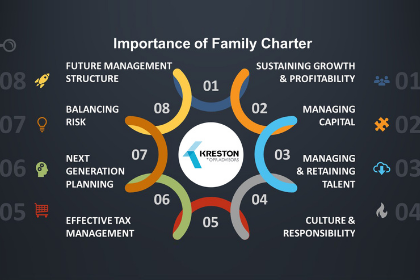
Family businesses have their own set of governing principles. These rules are adhered to by all the family members to manage the business and to drive it to achieve a common vision. Sustaining the business success, ensuring a smooth leadership transition wherever required, or managing shareholder changes – are delicate matters in a family business and it always helps to lay down rules to be followed in such a scenario.
A family charter is like a constitution or agreement which outlines the vision, mission, values, and goals of a family business. Most importantly, a family charter codifies the owner family’s relationship with the family business and the relationship of each family member with the others. It is a tool for good governance that ensures that every rule in the book is understood and correctly interpreted by every member of the family.
The Importance of a Family Charter
Family dynamics are always a big part of the running of a family business. At some point, it may get difficult to protect the business’s best interest while maintaining the family’s interpersonal relationships. Conversely, in an attempt to focus on business progress, the family’s needs maybe forgotten. Here’s a look at the importance of a family charter –
- A family charter outlines the founding values and principles of the business.
The family charter is an accessible document for everyone in the family. It is accepted and understood by the family as a whole.
- Leadership succession
A well-drafted charter can facilitate a smooth leadership succession to secure the business legacy for the next generation. Lack of a formal succession plan can be fatal for a family business.
- Facilitates Business Transition
Any business transition that may put a stress on familial relations or the business, such as a change of leadership, divestiture of the original business, or the start of a new business venture can be facilitated by a family charter. A family charter may outline the right course of action in such stressful transitions to create an environment of co-operation.
- Drafting a family charter promotes proactive discussions on various topics
The process of creating a family charter allows the family members to discuss and find an agreeable resolution for various sensitive and difficult topics. This proactive approach may help you smoothly maneuver unpleasant situations in the future.
Seven Topics That a Family Charter Should Include
Family Charters should be as comprehensive as possible. Of course, the charter should have a review cycle that allows for modifications and improvements to keep the guidelines relevant. But there are seven broad topics that every family charter should include –
- Defining the Family – The Family Charter should clearly state who qualifies as a family member and their descendant in a family business and who doesn’t. This helps in outlining the plan for the succession and beneficiaries of the business.
- Values of the Business – A Family Charter must outline the founding values and principles of business. If there are specific causes such as health or education which the business supports, they should also be clearly stated in the charter.
- Governance – Guidelines for strategic business decisions and even day-to-day running of the business should be given in a family charter. Agile governance systems and clearly defined powers and responsibilities of governing bodies such as the board of directors and the family council are an important part of the family charter.
- Business Ownership – Family Charters should outline mechanisms to help keep the business family-owned for generations to come. Defining succession plans and other major transitions help keep disputes at bay.
- Roles and Responsibilities – A family charter should define the roles and responsibilities for different positions in the business. It is wise to define the capabilities and qualifications which make a family member suitable for an important role in the business.
- Philanthropy – To strengthen family bonds, businesses take up join engagement opportunities for philanthropic activities and come together for the good of the society. The right causes to support and the budgets should be defined in the family charter.
- Term of Charter & Revision – Every charter should have a definite term and upon expiry of the term, a new family charter must be drafted. This helps the governance guidelines to stay relevant and flexible.
Conclusion
In summary, a family charter is an important device of effective management and governance in a family run business. Although it takes time and effort to draft a comprehensive family charter – the benefits of maintaining a family charter can be huge. This is an especially relevant document for family businesses in their 3rd or 4th generation with the involvement of several members.

